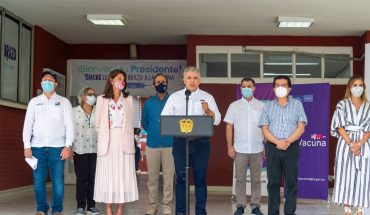
Accompanied by the ministers of the political committee and some parliamentarians of officialism, President Sebastián Piñera made an announcement from La Moneda to answer the call made by parliamentarians from Chile Let’s go to the opposition, to advance measures for the middle class. “We demanded that you tighten the throttle thoroughly,” the Commandee was told this week.
Today, Piñera reiterated that the government’s mission is to “do its best to protect and bring aid to all families in need.” For this reason, a “health safety net” has been built that now extends to the middle class because “Chile is a mostly middle-class country,” the President said.
The idea, citing Piñera’s words, is to tell these families “that they will not be alone and a helping and friendly hand will help them to stand up and walk again.” In this context, the head of state detailed the implementation of four measures:
A “Covid soft credit” program, which will be administered by the state and will cover up to 70% of the income of workers who were paid over the $500,000 per month before the crisis and who can credit a significant drop in them. The loan, which the Mandate would claim would benefit about 600,000 families, has a cap of $2,600,000 pesos, which will be disbursed in 4 monthly installments of up to $650,000 each, with an interest rate of 0%. In addition, you will have a 4-year term to be paid, with 1 year of grace and will be charged through withholding tax.
Piñera also committed the postponement of mortgage dividends, aid that will cover 100% of 6 dividends or 50% of 12 for those who have commitments for first home and that their value is less than 10,000 U.F. and that do not have a default of more than 29 days. The postponement will go to the rescue of unemployed or contracted and independent heads of households who can prove a significant drop in their income.
The third measure is an extension of the subsidy program for rents of up to 150 thousand pesos for three months, for leases of up to 400 thousand pesos. The measure is aimed at those who have seen a decrease of more than 30% of their income. According to Piñera, the stock benefits 50,000 families.
Finally, The State’s Support Credits (CAE) are also expanded. An exceptional CAE application process will open for families who have had a significant drop in their income. According to the Mandate’s speech, today, two-thirds of the total students in the education system receive the CAE or some “help” to study. “About 130,000 new students will be able to access this benefit and more than 80% will have state aid,” Piñera said, stressing that these new credits are going to have a 2% preferential rate and the payment will never exceed 10% of income.
The full plan, Piñera said, means aid for more than a million people and an investment of $1.5 billion. “We are living through very hard and very difficult times,” the representative said.
The Government had come amid a discussion that aimed at a possible withdrawal of 10% of the AFP’s savings and which, contrary to The Currency’s attempts, the debate was already set in public discussion and also in parliament itself.
It should be recalled that the installation of the debate on the withdrawal of funds from the AFPs intensified a response from the Executive, since it was a measure in which there was no provision to assign. The idea of withdrawing 10% of the planned funds so that the middle class can cope with the economic ravages of the pandemic divides the waters at all levels.
The President of the Christian Democracy, Fuad Chahin, appreciated the measures taken by President Sebastián Piñera and stated that his party was pleased that “measures for the middle class will begin to be taken in a good time”. However, he said that he would have liked to agree with the phalanx proposals.
Chahín said some of the measures go in the right line, such as credits with 0% interest, but there are others that raise doubts. “The postponement of the credits has to be interest-free,” said the D.C. helmsman, for whom those with the most problems will be left, “outside the possibility of re-impacting their credits in good condition.”
Despite assessing the Fuad Chahín said there are advertisements that are “rightly insufficient,” such as the issue of savings allowance. “It seems to us that both the amount of the savings contribution and the rent that can be co-financed is very low and leaves most of the middle sectors out.” In addition, the D.C. MP said there are measures that simply are not.
Chahin aims to “forgive college credits such as the CAE” or “the possibility of withdrawing some of the savings from afps.” “We invited them to discuss these measures to give them a real solution and not just put off the problems to the middle class,” the DC president said.
Another reaction came from the Deputy and Vice-President of Christian Democracy (DC) Joanna Pérez, who lamented as the government “insists on continuing to indebted to the middle class and not giving real support.” On the contrary, he says, the Executive continues to negotiate with agreements with banks for mortgage loans and for government-backed debts in education matters. “This is not help but only generates more business for the banking system that has generated abuse and has the middle class in debt,” he said.
MEP Pérez said direct transfers were needed and open to the possibility of withdrawal of a percentage of AFP funds. “That the state takes over with the responsible middle class, which is also an engine of SMEs and does not have a clear answer today,” he said.
PR President Carlos Maldonado also joined the reactions and, through his Twitter account, said the announcement of “benefits” for the middle class insists on a “neoliberal vision” that instead of a direct contribution implies “new credits, that is, more indebtedness for an already over-indebted middle class.”
“And, instead of free, the extension of the CAE, so that private people continue to profit from education,” added the helmsman of the radicals.
From the PPD, the party’s helmsman, Heraldo Muñoz, said it was time for the President to hear “the pain of the middle class” that has been the main victim of this crisis. “Every move that goes to your aid is welcome,” he said. However, he accused that the solution cannot be the indebtedness of an already over-indebted middle class.
“What needs to be done is to go to direct transfers of money into the pockets of middle-class families and for that we must promote the IFE 2.0 that targeted middle-class sectors. As the social register of households has increased to 80% more vulnerable. That is working very slowly and the government has to remedy this situation,” he added.
Muñoz said that there are also measures that are announced and that he finds “interesting but insufficient”. “The headlines are good but the descents are bad,” he said. For example, he says, the postponement of housing debts for 6 months to homes of less than 10 thousand UF. “That only for those who are up to date and that delinquency does not go down from 29 days. What a family in these circumstances is not going to have more than two or three months of delinquency,” he said.
“Here the facts are more important than words,” concludes Heraldo Muñoz since his confinement.





